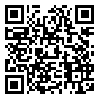BibTeX | RIS | EndNote | Medlars | ProCite | Reference Manager | RefWorks
Send citation to:
URL: http://journal.rums.ac.ir/article-1-7749-en.html
Background and Objectives: Sleep quality and academic self-efficacy are key factors influencing the academic success and mental health of nursing students. This study aimed to investigate the status of sleep quality and academic self-efficacy in nursing students.
Material and Methods: This descriptive cross-sectional study was conducted in 2023 on 84 nursing students at Zanjan University of Medical Sciences. Participants were selected using convenience sampling. Data were collected using the Pittsburgh Sleep Quality Index (PSQI) and the Academic Self-Efficacy Beliefs Questionnaire (ASEBQ). Independent t-test and one-way ANOVA were used for data analysis.
Results: The mean and standard deviation of students' sleep quality scores were 7.62±2.83, and those of academic self-efficacy scores were 147.91±11.46. The results indicated no statistically significant difference in sleep quality and academic self-efficacy scores among different demographic groups (p>0.05).
Conclusion: The current study suggestes that sleep quality and academic self-efficacy among nursing students are at a moderate level and are not related to demographic characteristics.
Keywords: Sleep quality, Academic self-efficacy, Nursing students, Zanjan
Funding: This study did not have any funds.
Conflict of interest: None declared.
Ethical considerations: The Ethics Committee of Zanjan University of Medical Sciences and Health Services approved the study (IR.ZUMS.REC.1402.172).
Authors’ contributions:
- Conceptualization: Mir Amirhossein Seyednazari
- Methodology: Mir Amirhossein Seyednazari
- Data collection: Amirmohammad Dorosti
- Formal analysis: Mir Amirhossein Seyednazari
- Supervision: Hamidreza Omrani
- Project administration: Mir Amirhossein Seyednazari
- Writing – original draft: Amirmohammad Dorosti
- Writing – review & editing: Amirmohammad Dorosti
J Rafsanjan Univ Med Sci 2025; 24 (5): ????. [Farsi]
Received: 2025/05/27 | Accepted: 2025/07/22 | Published: 2025/08/19
| Rights and permissions | |
 |
This work is licensed under a Creative Commons Attribution-NonCommercial 4.0 International License. |







